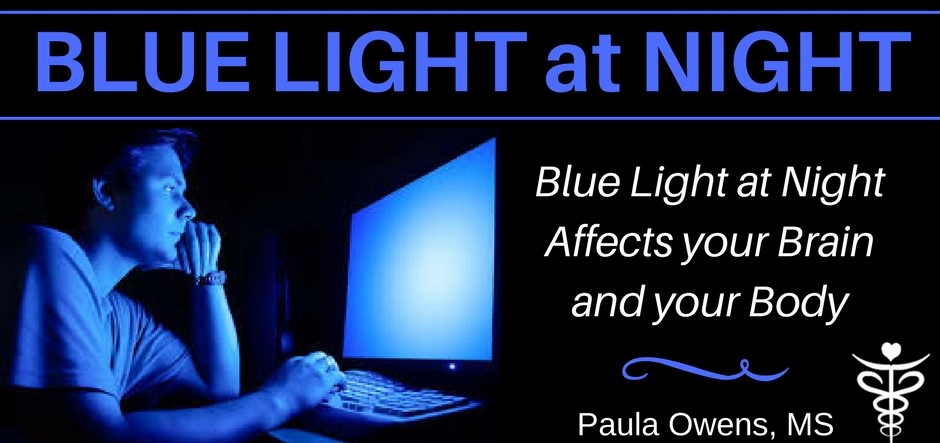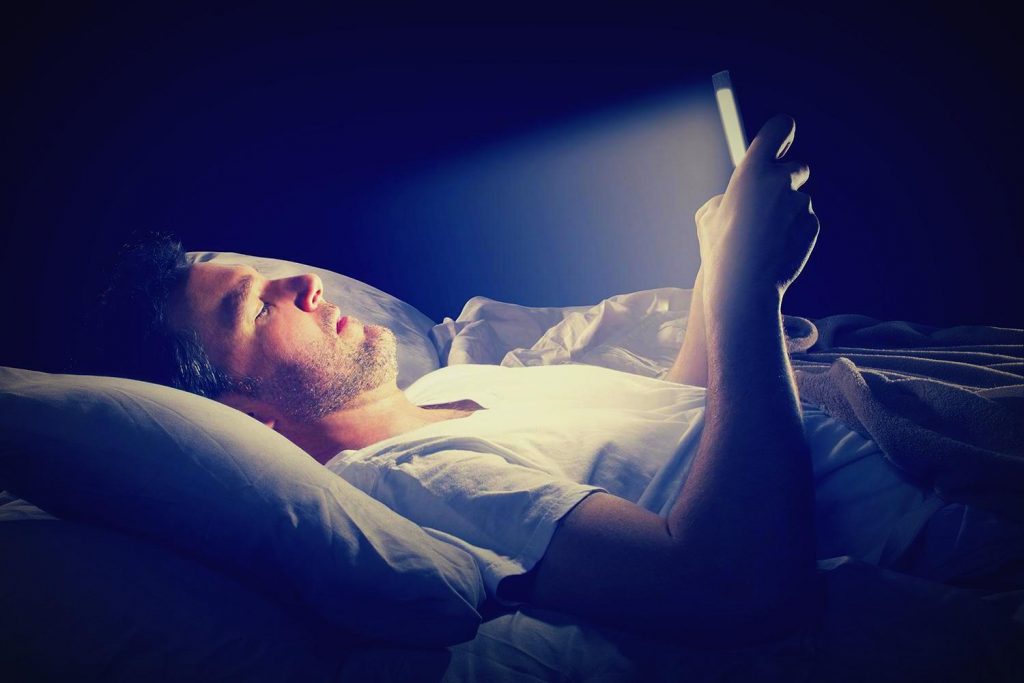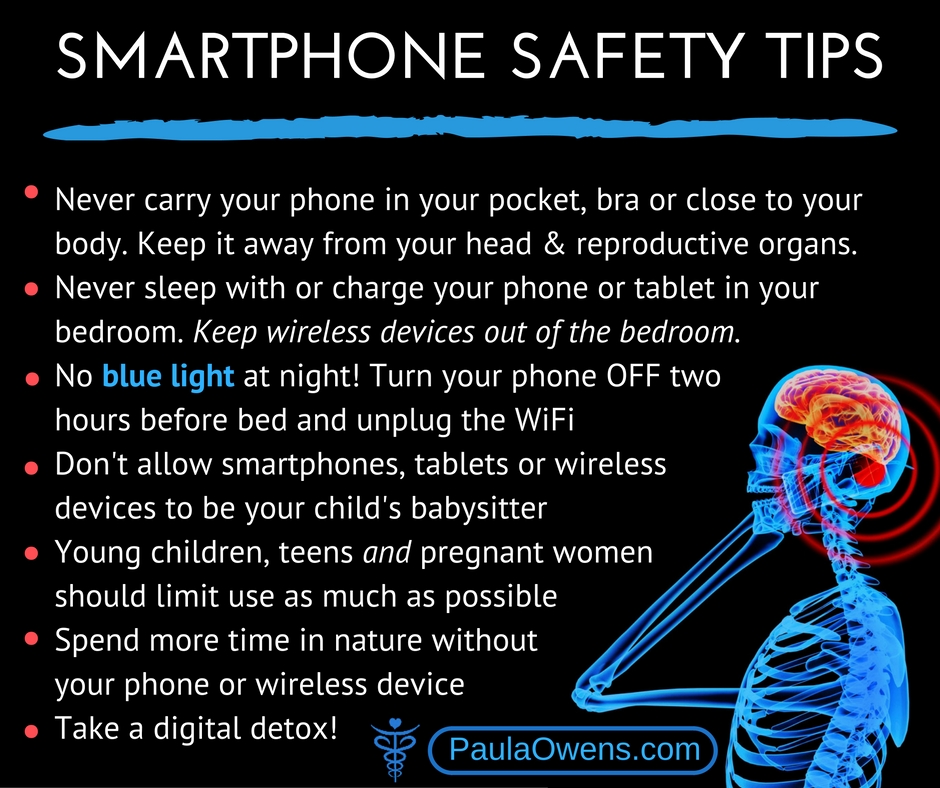Educating and Empowering You to Heal, Thrive, and Live a Happy, Healthy Lifestyle
Blue Light at Night Affects Your Brain and Body
 Study after study has found evidence that exposure to blue light at night from electronics with screens and energy-efficient lighting is harmful to our brain and body, the environment, and detrimental to our health.
Study after study has found evidence that exposure to blue light at night from electronics with screens and energy-efficient lighting is harmful to our brain and body, the environment, and detrimental to our health.
Exposure to blue light at night, artificial light at night, and working the night shift has been linked to several types of cancer (breast, prostate), diabetes, heart disease, and obesity.
Blue light exposure at night from smartphones, TVs, iPads, tablets and computers, and lack of sunlight and full spectrum light during the day is a major risk factor for insulin resistance, anxiety, depression, mood disorders, headaches, and other health problems.
Glowing screens at night have a negative impact on kids too! We now know that smartphones, computers and Xboxes are a form of digital drug. Brain imaging researchers have found brain changes to be very similar in those addicted to their smartphones and other digital devices as those who are addicted to alcohol, cocaine, heroin, marijuana, meth and other drugs. Technology is so hyper-arousing that it raises dopamine levels, the feel-good neurotransmitter involved in drug, alcohol and other addictions. In addition, hundreds of clinical studies show that screen use increases depression, anxiety and aggression, and can even lead to psychotic-like behavior and a loss of touch with reality.
 Sunlight and natural light during the daytime is crucial for improving alertness, memory and cognitive function, performance, mood, healthy mitochondrial function, and a healthy circadian rhythm. However, exposure to bright artificial lights and blue light after sundown and late at night is very problematic.
Sunlight and natural light during the daytime is crucial for improving alertness, memory and cognitive function, performance, mood, healthy mitochondrial function, and a healthy circadian rhythm. However, exposure to bright artificial lights and blue light after sundown and late at night is very problematic.
While light at night of any kind can suppress the secretion of melatonin, blue light at night does so more powerfully. Just 30 minutes of blue light exposure before bedtime has been shown to disrupt REM sleep. Using electronic devices before bed to wind down or relax sends a message to your brain to stay awake longer, and results in difficulty falling and staying asleep, and disrupted circadian rhythms leading to a host of health issues.
Blue Light at Night
Affects Your Brain, Body, Sleep, Mood, Hormones & Health
The science is clear on the links between blue light at night from smartphones, tablets and computer screens, and the health risks of a disrupted circadian rhythm.
Use and abuse of smartphones and screens: Exposure to blue light at night…
- Affects sleep quality and reduces sleep quantity
- Increases anxiety and alters mood chemistry
- Triggers memory problems and trouble learning
- Causes behavioral problems and addiction similar to drugs and alcohol
- Disrupts hormones: raises insulin and cortisol, suppresses melatonin, lowers leptin and testosterone
- Destroys dopamine, a neurotransmitter that helps control the brain’s reward and pleasure centers, and helps regulate movement and emotional responses. Dopamine is also involved in motivated behavior.
- Developmental process in toddlers and children is greatly affected: social interaction, creativity, compassion, engagement and communication skills
- Alters glucose metabolism, raises blood sugar and causes insulin resistance
- Disrupts your natural circadian rhythm. Circadian rhythms control the timing of many physiological processes, determine sleeping and feeding patterns, brain activity, hormone production, and cell regeneration.
- Compromises immune function
- Exacerbates and intensifies migraine headaches
- Causes eye strain, dry eyes, blurry vision, damages the retina, and increases risk of macular degeneration
- Reduces muscle strength and causes greater atrophy (muscle loss)
- Triggers early-stage osteoporosis
- Increases risk of diabetes, depression, obesity, heart disease, gastrointestinal problems, breast cancer, prostate cancer, and other diseases
Some of these detrimental effects apply to animals as well.
Be Mindful of Blue Light Exposure at Night and Screen Addiction

Blue Light at night affects your brain, mood, hormones and health
Helpful Tips for you and your family
—Avoid bright screens and artificial lights two to three hours before bed.
—Unplug the WiFi two hours before bedtime and when not in use.
—Shut down all electronic devices two hours before bedtime or by 8pm.
—Limit use of wireless devices and screen access. Set an example for your children.
—Do not store your phone in your pocket, underneath your bra strap or anywhere on your body.
—Do not wear devices on your body (smart phones, Apple watches, ear buds, Air Pods, fitness trackers)
—Instead of reading off of a screen, read an actual book. Reading actual print material increases reading comprehension too.
—Practice healthy sleep hygiene and prepare your environment for restful sleep. Dim the lights in your home when the sun goes down so your body can produce melatonin naturally. Turn on salt lamps or light some candles.
—Change to full spectrum lighting. Put a red or orange-colored light bulb in your bedside lamp or use a salt lamp in your bedroom.
—Wear orange-tinted glasses or blue-blocking glasses that block out only blue light.
—Use a blue light filter. Install the F.lux app, Twilight app or another blue light filter app onto your wireless devices. Blue light filters prevent significant amounts of blue light emitted from these devices from reaching your eyes without affecting the visibility of the display.
—Remove artificial sources of light from your bedroom and your children’s bedrooms.
—Keep all wireless devices and electronics out of the bedroom. Never sleep with or charge your cell phone or tablet in the bedroom.
—Expose yourself to plenty of natural, bright light and sunlight outdoors (without sunglasses) during the day to boost mood, energy and alertness during the day. Doing so will help you to fall asleep at night, reset your natural circadian rhythm, and encourage your body’s natural sleep/wake cycle.
—Go outdoors every morning, take a walk and get 15 minutes of sunlight without chemical sunscreen applied to your skin and without sunglasses. Wear a hat or a visor for protection. Leave your phone at home!
—Practice grounding by putting your bare feet on the earth. This helps to produce negative electrons and reduce manufactured electric fields.
—Take a digital detox. Go camping! Studies have reported that those who spent one week camping exposed to only natural light and no electronic devices reset their natural biological body clocks (circadian rhythm), and synchronized their melatonin hormones with the sunrise and sunset.

Learn More!
- Dirty Electricity: Tips to Reduce EMF and EMR Exposure
- What Every Parent Needs to Know About Childhood Nutrition, Health & Wellness
- Melatonin Health Benefits

